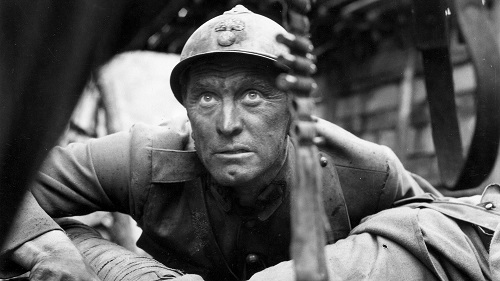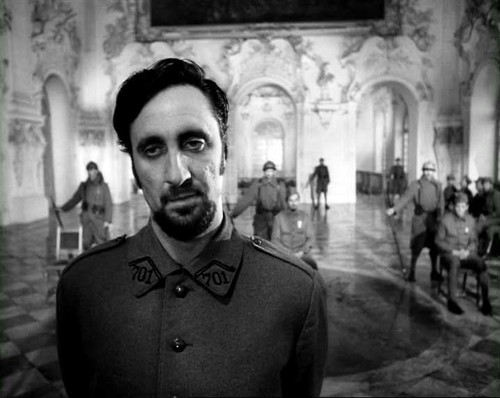By Film Noir Blonde and Mike Wilmington
The Noir File is FNB’s guide to classic film noir, neo-noir and pre-noir from the schedule of Turner Classic Movies (TCM), which broadcasts them uncut and uninterrupted. The times are Eastern Standard and (Pacific Standard).
PICK OF THE WEEK
“Paths of Glory” (1957, Stanley Kubrick). Saturday, July 27: 1:30 p.m. (10:30 a.m.)
In 1957, Stanley Kubrick, still in his 20s – with “Dr. Strangelove,” and “2001: A Space Odyssey” still in his future – made one of the greatest of all anti-war movies: his grim, stylish and incredibly moving adaptation of Humphrey Cobb’s World War I novel, “Paths of Glory.”
Kubrick may not have known war first hand. But, in that film, he created an indelible image of war’s inhumanity and horror. “Paths of Glory” is a compelling, wrenching nightmare of a movie with a brilliant (and very noir) cast including Kirk Douglas, Ralph Meeker, George Macready and (at his best, or worst) Timothy Carey.
Based on a real-life episode, the movie was made on location in Bavaria and is set in the French trenches, where the infantry soldiers eat and sleep in the cold, dirt, and mud – and from which they charge forth to fight and die. It’s also set in an elegant chateau, far from the battlefield, where rich, ambitious generals plot the sometimes-insane strategies that will get their men killed.
When one ill-advised attack against the Germans fails, Macready, as the vainglorious Gen. Mireau, flies into a murderous rage and demands that his own men be executed for cowardice. His superior, the wily Gen. Broulard (Adolphe Menjou), argues the number of the condemned down to three soldiers: Meeker, Carey and Joe Turkel. Defending them is Colonel Dax, the regiment’s courageous and idealistic commanding officer (played by Douglas, one of the leading Hollywood liberals of the ’50s and ’60s). Outraged by the mad injustice of the trumped-up court-martial , Dax – a famous criminal lawyer in civilian life – argues eloquently and fearlessly for the lives of those three guiltless men.
What a great movie this is! “Paths of Glory” is a film to see when you’re young and more innocent, like the three soldiers. And to see again when you’re stronger, more mature and full of fiery ideals, like Dax. And finally to watch yet again when you’re even older and have witnessed a lifetime of the awful compromises and vile injustices that “Paths of Glory” paints with such absolute lucidity, such deadly, inexorable narrative force.
By the time he directed and co-wrote “Paths of Glory,” Kubrick, 29, had three features already under his belt (including the classic 1956 film noir, “The Killing”). His partner on “The Killing,” James B. Harris, produced “Paths of Glory.” Douglas – then at the height of his Hollywood stardom and power – made it happen.
Two great American novelists collaborated with Kubrick on the screenplay: Oklahoma-born noir ace Jim Thompson (author of the crime classics “The Killer Inside Me,” “The Grifters” and “The Getaway”) and the acidly funny Southern novelist Calder Willingham (“End as a Man,” “Eternal Fire”) Probably thanks to those two, “Paths of Glory” has one of the darkest visions, some of the richest characters and some of the most pungent dialogue of any American movie of that era.
Kubrick’s masterpiece of war’s injustice seduces you with its beauty, shatters you with its horror. The battle scenes are shot with a black and white grit and shock reminiscent of Lewis Milestone’s “All Quiet on the Western Front,” but also with the Max Ophuls-like grace and romanticism that Kubrick loved and that ironically permeates his film.
War is hell. It’s also noir.
“Paths of Glory” is available in DVD on Criterion. [Read more…]












From FNB readers